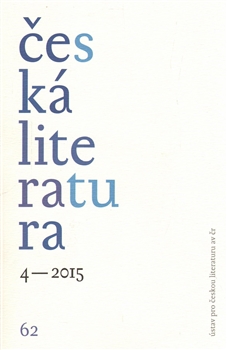Exulantský kancionál Václava Klejcha a utváření české kolektivní paměti
Václav Klejch’s exile hymn book and the formation
of the Czech collective memory
Author(s): Marie ŠkarpováSubject(s): Czech Literature
Published by: AV ČR - Akademie věd České republiky - Ústav pro českou literaturu
Keywords: Václav Klejch;Daniel Krman Jnr.;collective memory;cultural memory;communicative memory;hymnbook;hymnography;preface;Czech émigré literature;18th century Czech literature
Summary/Abstract: The objective of this study is to present the Czech émigré Václav Klejch (1682–1737), not only as a publisher, distributor, editor, translator and author of Czech literature, but also as a protagonist in a commemoration that systematically attempts to foster the collective memory of the Czech community at the given time. One of Klejch’s most interesting commemorative acts can be considered to be his Evangelický kancionál (Evangelical Hymn Book), which he first published in Zittau at his own expense in 1717 to mark the 200th anniversary of the public appearance of Martin Luther in Wittenberg, the preparations for which were co-arranged by the Superintendent of the Evangelical Church in Upper Hungary Daniel Krman Jnr. (1663–1740). The actual author of the hymn book was Klejch, while Krman merely subjected the collected song repertoire to a doctrinal review, wrote its preface and added the names of the authors and the original foreign-language lyrics to the hymns. However, Klejch was not entirely satisfied with Krman’s work, as in the second and third edition of Evangelický kancionál (1722, 1727) he interceded in the sphere that he had vouchsafed to Krman in the first edition, adding his own preface to Krman’s and correcting or supplementing some of Krman’s information on the original song lyrics and their authors. Hence within the framework of a single hymn book two attempts were made to present a rather different exposition of the Czech hymnographic past. Whereas Krman, as a representative of orthodox Lutheranism, offered a strictly “Lutheran” interpretation of the history of Czech sacred song with the emphasis on the foundational importance of Martin Luther, and was primarily concerned with the completion of the “canonical” texts of Lutheran hymnography, Klejch in contrast endeavoured to refer to the wealth of Czech reform hymnography, beginning with the founding figure Jan Hus, and to stress the uniqueness of the Czech contribution to European reform hymnography. Klejch’s alterations to Krman’s basic conception also tellingly refer to the complex situation among Czech post-White Mountain émigrés, who in exile were endeavouring to defend their specific contribution before members of other reform churches. Together with his other prefaces, dealing with the history of the publication of Czech Bible translations (1720), Czech catechisms (1727) and Czech devotional books (1734), Klejch’s preface on the history of the publication of Czech homiletic books formed a complementary whole in which he endeavoured to systematically present the primary features of printed Czech (Reformation) religious literature with a similar expository approach. Klejch’s intensive involvement in Czech literary life in the first half of the 18th century, which actually has its counterpart in the oppositely motivated activities of his contemporary, Jesuit Antonín Koniáš (1691–1760), can also be seen in the context of the fading memory of living witnesses to the old Czech Reformation, as the religious identity of Czech non-Catholics was increasingly crystallizing with the aid of the single means that allowed for “permanent” transgenerational memory, i.e. books. Klejch was evidently endeavouring to ensure that the Reformation element did not disappear from the Czech collective memory, while attempting to mould the collective memory of Evangelicals using Czech as a liturgical language, so as to ensure that their awareness of the unique Czech contribution to the history of the European religious Reformation did not disappear.
Journal: Česká literatura
- Issue Year: 63/2015
- Issue No: 4
- Page Range: 515-540
- Page Count: 26
- Language: Czech

